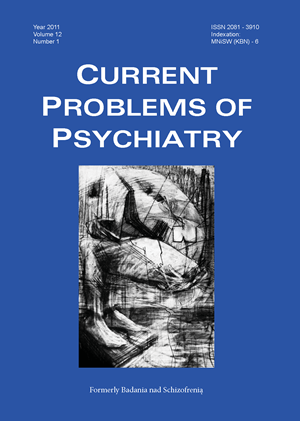Simulation and factitious malingering
Keywords:
Münchausen syndrome, simulation, personality, somatic disordersAbstract
Reasons, why people simulate a disease are various, including expected financial benefits, the need to feel the sympathy of other people, or mundane feeling of pleasure caused by cheating another person. The main aim of this article is to analyse the possible strategies of detecting and diagnosing the simulation and its alike various forms of Münchausen syndrome – both by proxy and similar alleged disease per procura. Münchausen syndrome, classified as psychical disease, is characterised by conscious creating own pathological symptoms. The prevalence of this disorder is unknown. It is estimated that around 5-10% of all hospital admissions is due to simulated symptoms. The aetiology of Münchausen syndrome has not been explained so far either. In the specialist literature it is being underlined that the crucial importance in development of this disorder is played by both the somatic as well as psychical factors. This syndrome is rarely diagnosed and identified and poses a real challenge to the health care staff, because it causes a lot of diagnostic difficulties. The core importance in the diagnosis play the good knowledge of clinical patterns and symptoms of this disease, among which there is purposeful inducing of psychical or somatic syndromes in self, pathological lying and frequent changing of hospitalisation place. Particularly important is carefully taken history as well as insightful conversation and observation of the patient with often incompatible results of additional examinations.
References
1. Cunnien A.J. Psychiatric and medical syndromes associated with deception, w: R. Rogers (red.), Clinical assessment of malingering and deception, wyd. 2, New York; Guilford: 1997 s. 23–46.
2. Ford C.V. Factitious disorders and malingering. W: Ebert M.H., Loosen P.T., Nurcombe B., Leckman J.F. red., Psychiatry Current diagnosis & treatment. Mc Graw Hill Medical, New York, Chicago, San Francisco, Lisbon, Madrid, Mexico City, Milan, new Delhi, San Juan, Seoul, Singapore, Sydney, Toronto; 2008.
3. Rothenhausler H.B., Kapfhammer H.P. Munchhausen patients in general hospitals-Clinical features and treatment approaches in C-L psychiatry settings Psychiatr. Prax., 2002; 29(7): 381-387.
4. Kaufman D.L. Munchausen syndrome by proxy: Medical issues. W: Olson R.A., Mullins L.L., Giliman J.B., Chaney J.M. (red.), The sourcebook of pediatric psychology. Boston; Allyn and Bacon: 1994, s. 361-374.
5. Hłasko M. Piękni dwudziestoletni. Warszawa; Wyd. Alfa: 1988, s. 76-77.
6. DSM IV American Psychiatric Association: Diagnostic and statistical manual of mental disorders. 4th edition. Washington; DC APA: 2000.
7. DSM IV-TR Kryteria diagnostyczne według DSM-IV-TR American Psychiatric Association wyd I polskie, red. J. Wiórka, Wyd. Elsevier Urban & Partner: 2008.
8. Asher R. Munchausen syndrome. Lancet, 1951; 1: 339-341.
9. Bools Ch. Factitious illness by proxy. B. J. Psychiat., 1996; 169: 268-275.
10. Ehlers W., Plassmann R. Diagnosis of narcissistic self-esteem regulation in patients with factitious illness (Munchausen syndrome). Psychother. Psychosom., 1994; 62: 69-77.
11. Huffman J.C., Stern T.A. The diagnosis and treatment of Munchausen's syndrome. Gen. Hosp. Psychiatry, 2003; 25(5): 358-363.
12. Ebert M.H., Nurcombe B., Loosen P.T., Leckman J.F. Current Diagnosis & Treatment Psychiatry. Mc Graw Hill Medical, New York, Chicago, San Francisco, Lisbon, Madrid, Mexico City, Milan, new Delhi, San Juan, Seoul, Singapore, Sydney, Toronto; 2008.
Downloads
Published
Issue
Section
License
Copyright (c) 2011 Authors

This work is licensed under a Creative Commons Attribution-NonCommercial-NoDerivatives 3.0 Unported License.


